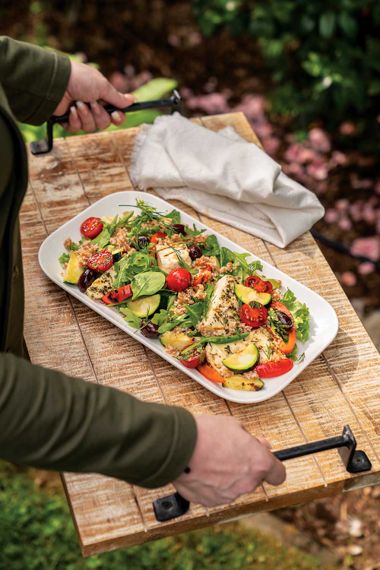
Halloumi, a Greek-style cheese with a firm, chewy, almost meaty texture that makes it the ultimate—and literal!—cheesesteak option for the grill because it can withstand the soaring heat without melting. The intense heat of grilling also brings out the sweetness of the salad’s red peppers and zucchini, while a tomato dressing brightens up the whole meal. Farro, spelt, and quinoa are good alternatives to freekeh, but you can also make this salad grain free if you prefer.
Great grain
Freekeh is durum wheat that’s harvested while young and green. After being roasted over an open fire, its straw and chaff is rubbed off, leaving behind a smoky-tasting tender grain that is higher in protein and fibre than most other whole grains.
Cheesesteak Salad with Chunky Tomato Vinaigrette
Ingredients
- 2 cups (500 mL) cherry tomatoes, halved
- 1/3 cup (80 mL) Kalamata olives
- 1/2 cup (125 mL) sliced mint or basil
- 1 garlic clove, minced
- 2 tsp (10 mL) lemon zest
- 1/4 tsp (1 mL) salt (optional)
- 2 Tbsp (30 mL) balsamic vinegar
- 2 Tbsp (30 mL) extra-virgin olive oil
- 1 cup (250 mL) freekeh
- 8 1/2 oz (250 g) block halloumi cheese
- 1 tsp (5 mL) Italian or za’atar seasoning
- 2 tsp (10 mL) extra-virgin olive oil
- 2 red bell peppers, seeded and quartered
- 2 small zucchini, sliced in half lengthwise
- 8 cups (1 L) salad greens
Nutrition
Per serving:
- calories453
- protein18 g
- total fat28 g
- sat. fat12 g
- total carbohydrates36 g
- sugars3 g
- fibre9 g
- sodium752 mg
Directions
01
In medium-sized bowl, stir together tomatoes, olives, mint or basil, garlic, lemon zest, and salt (if using). Stir in balsamic vinegar and olive oil. Let dressing sit for 30 minutes.
02
In medium saucepan, place freekeh, 2 1/2 cups (625 mL) water, and a couple pinches of salt. Bring to a boil, reduce heat to medium-low and simmer, covered, until freekeh is tender, about 20 minutes. Drain off any excess liquid. Set aside for 5 minutes and then fluff with fork.
03
Slice halloumi lengthwise into 4 slabs. In small bowl, mix together Italian seasoning or za’atar and olive oil. Brush mixture over halloumi slices. Heat grill to medium and grease grates. Cook halloumi slices until tender and grill marks appear, 2 to 3 minutes per side.
04
Brush pepper and zucchini slices with oil and lightly season with salt (optional). Grill until tender and slightly charred, about 2 to 3 minutes per side. Remove from grill. Peppers will likely cook faster than zucchini. When cool enough to handle, slice peppers into strips and zucchini into half moons.
05
To assemble salad, divide greens among serving plates and top with freekeh, vegetables, halloumi, and tomato vinaigrette.





